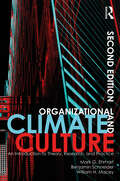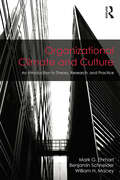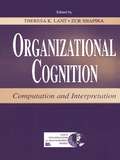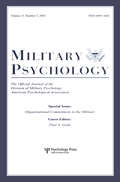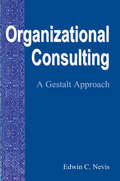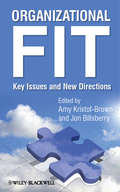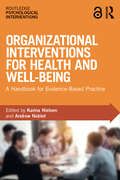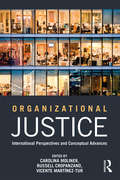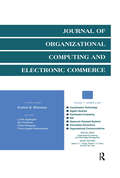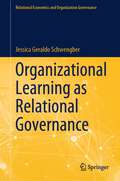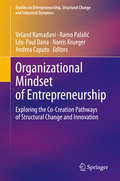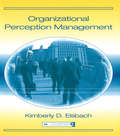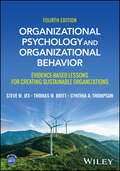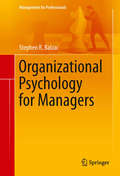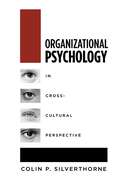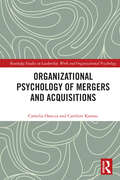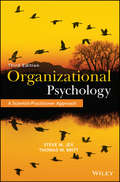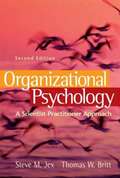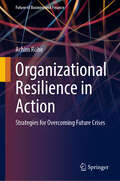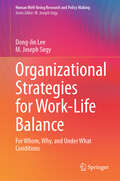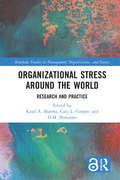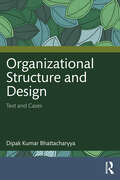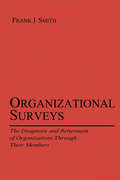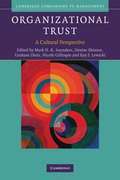- Table View
- List View
Organizational Climate and Culture: An Introduction to Theory, Research, and Practice
by Mark G. Ehrhart Benjamin Schneider William H. MaceyOrganizational Climate and Culture breaks down the barriers between the fields of organizational climate and organizational culture to encourage a broader understanding of how an organization’s environment affects its functioning and performance.Building on in-depth reviews of the development of both the organizational climate and organizational culture literatures, the book identifies key research issues as well as how practitioners can utilize the key concepts when conducting organizational cultural inquiries and leading change efforts. The book identifies the key strengths and limitations of research and theory on each topic and then presents ways each field could learn from the other. The authors also identify how practitioners can leverage the key concepts in the two literatures when conducting organizational cultural inquiries leading to climate and culture change efforts. The end product is an in-depth discussion and reconciliation of organizational climate and culture unlike anything that has come before it.In this updated edition, Mark G. Ehrhart, Benjamin Schneider and William H. Macey present a thorough examination of both the history and current status of research in each field, as well as areas for their potential integration. Academics, practitioners, and students will all deepen their understanding of how organizations function and will gain insights into how to improve both organizational research and organizational effectiveness.
Organizational Climate and Culture: An Introduction to Theory, Research, and Practice (Organization and Management Series)
by William H. Macey Benjamin Schneider Mark G. EhrhartThe fields of organizational climate and organizational culture have co-existed for several decades with very little integration between the two. In Organizational Climate and Culture: An Introduction to Theory, Research, and Practice, Mark G. Ehrhart, Benjamin Schneider, and William H. Macey break down the barriers between these fields to encourage a broader understanding of how an organization’s environment affects its functioning and performance. Building on in-depth reviews of the development of both the organizational climate and organizational culture literatures, the authors identify the key issues that researchers in each field could learn from the other and provide recommendations for the integration of the two. They also identify how practitioners can utilize the key concepts in the two literatures when conducting organizational cultural inquiries and leading change efforts. The end product is an in-depth discussion of organizational climate and culture unlike anything that has come before that provides unique insights for a broad audience of academics, practitioners, and students.
Organizational Cognition: Computation and Interpretation (Organization and Management Series)
by Zur Shapira Theresa K. LantOrganizational Cognition is a collection of chapters written by scholars from around the world. The editors outline the history of two approaches to the study of cognition in organizations, the computational approach and the interpretive approach. The chapters represent some of the most cutting-edge research on organizational cognition, covering research that spans many levels of analysis. Much of the work in the book demonstrates how computational and interpretive approaches can be combined in a way that provides greater insight into cognitive processes in and among organizations. The editors conclude by elaborating the likely boundary conditions of each approach and how they can be combined for a more complete understanding of cognition in organizations.
Organizational Commitment in the Military: A Special Issue of military Psychology
by Paul A. GadeMost military researchers who have attempted to measure organizational commitment have done so on an ad hoc basis, preferring to invent new items and scales rather than incorporate well-established measures. The purpose of this special issue is to reverse this trend by bringing military organizational commitment research into the scientific mainstream and to do so in ways that will prove useful to military services while advancing organizational commitment theory and knowledge. This special issue grew out of a symposium conducted at the 1998 American Psychological Association Convention that arose when many in the field recognized the practical importance of measuring organizational commitment while maintaining a healthy concern for ensuring that this measurement was well-grounded in organizational commitment theory. Taken together, the articles in this issue demonstrate the concepts of affective and continuance commitment and their underlying measures by using them in different military samples and under a variety operational conditions.
Organizational Consulting: A Gestalt Approach
by Edwin C. NevisIn this classic text, pioneering organizational consultant Edwin C. Nevis presents an approach to organizational consulting which is grounded in Gestalt theory. Nevis brings his well-known insight, conceptual clarity and decades of experience to bear on the entire spectrum of concerns facing organizational consultants in a wide variety of settings. Beginning with the development of the Gestalt approach and the "Cycle of Experience" model, Nevis traces the implications of Gestalt theory for such areas as organizational assessment, modes of influence in organizations, dealing with resistance, developing relationships, working at the boundary and the matter of the consultant's presence. The conceptual framework provided in this groundbreaking work gives organizational consultants a powerful tool for understanding and influencing the behavior of organizations, and at the same time invites them to actively partake in the ongoing development of their unique individual styles.
Organizational Design
by Richard M. Burton Børge Obel Dorthe Døjbak Håkonsson Burton, Richard M. and Obel, Børge and Håkonsson, Dorthe DøjbakIn today's volatile business environment, it is more important than ever that managers, whether of a global multinational or a small team, should understand the fundamentals of organizational design. Written specifically for executives and executive MBA students, the new edition of this successful book provides a step-by-step 'how to' guide for designing an organization. It features comprehensive coverage of the key aspects of organizational design, including goals, strategy, process, people, coordination, control and incentives. These aspects are explained through the use of a unique series of 2 x 2 graphs that provide an integrated, spatial way to assess and plan organizational design. The new edition features a number of important improvements, including a new framework for understanding leadership and organizational climate, the introduction of the concept of manoeuvrability and a completely new chapter examining joint ventures, mergers, partnerships and strategic alliances.
Organizational Fit
by Amy L. Kristof-Brown Jon BillsberryAn ambitious survey of the field, by an international group of scholars, that looks toward the future of person-organization fit. Explores how people form their impressions of fit and the impact these have on their behavior, and how companies can maximize fit Includes multiple perspectives on the topic of how people fit into organizations, discussing issues across the field and incorporating insights from related disciplines Actively encourages scholars to take part in organizational fit research, drawing on workshops and symposia held specially for this book to explore some of the creative directions that the field is taking into the future
Organizational Interventions for Health and Well-being: A Handbook for Evidence-Based Practice
by Karina Nielsen Andrew NobletThis important new collection provides not only a comprehensive overview of how organizational interventions can improve health and well-being in the workplace - addressing its causes rather than the symptoms - but also the practical issues faced in their design, implementation and evaluation. Drawing on a range of case studies and empirical investigations, it is the first book to seriously examine each element of the intervention process, and to recognize the individual, group, leader and organizational factors that researchers should consider. The authors describe the various challenges to such collaborative processes, as well as the specific methods and tools that can be used in response. Each chapter offers practical, evidence-based guidance. Featuring a final section examining new directions and approaches in organizational intervention research, the book features contributions from some of the leading international researchers in the field. It will be essential reading for any researcher or practitioner interested in the practical issues involved in improving the organization, design and management of the contemporary workplace.
Organizational Justice: International perspectives and conceptual advances
by Carolina Moliner Russell Cropanzano Vicente Martínez-TurOrganizational justice – the perception of workplace fairness – can bring important benefits not only to the health and well-being of individual employees but also to the productivity of organizations themselves. This timely new collection, with contributions from leading researchers from around the world, considers organizational justice in an era when globalization has resulted in rapid organizational change, greater job insecurity, and increasing worker stress. Both comprehensive and cutting edge, the book initially considers what we mean by organizational justice in its relationship to self-interest, social identity, and personal moral codes. But moving beyond the perceptions of individuals, the book also reflects the increasing interest in the roles of teammates and leaders in creating organizational justice. There follow chapters on the negative results of perceived injustice, specifically around physical and mental employee health, as well as its deleterious impact on organizational productivity. Providing a definitive, state-of-the-art overview of the field, the book not only clarifies the key concepts and ideas that inform organizational justice but also explores their importance for today’s organizations, managers, and employees. Including a final section that both suggests new areas for research and critically reflects on the field itself, this will be essential reading for researchers and students across business and management, organizational studies, HRM, and organizational and work psychology.
Organizational Learning and Knowledge Management: A Special Issue of the journal of Organizational Computing and Electronic Commerce
by Lynda M. Applegate Andrew B. Whinston Clyde W. Holsapple Franz J. Radermacher Ravi KalakotaThis issue is based on three articles presented at the Fourth Pacific Asia Conference on Information Systems held in Hong Kong from June 1 through 3, 2000. The articles are concerned with various knowledge management issues in the Internet era.. First published in 2001 as Volume 11 of A JOURNAL OF ORGANIZATIONAL COMPUTING AND ELECTRONIC COMMERCE.
Organizational Learning as Relational Governance (Relational Economics and Organization Governance)
by Jessica Geraldo SchwengberThis book critically examines existing organizational learning theories that often center on employees and adopt a neo-classical organizational view. In this book, organizational learning (OL) is conceptualized from a relational governance perspective. Departing from the relational economics approach, it describes organizations as dynamic nexuses of stakeholders' resources and interests, extending beyond conventional intra-organizational contexts to encompass an open systems view. By viewing organizations as independent entities, distinct from individual stakeholders, the author introduces the concept of transactions as the fundamental unit of analysis in organization theory. Stakeholders contribute diverse rationalities, and OL emerges as the process of relationalizing these rationalities, enabling multi-contextual transactions within organizations. This book sheds light on epistemological and ontological challenges in OL literature, such as the OL paradox and anthropomorphism. To address these issues, the author advocates a shift from methodological individualism to methodological relationism, wherein OL becomes a micro-meso-relational process involving both stakeholders and the organization as an entity. Combining conceptual insights with empirical evidence from a multinational company's case study, the book showcases how relational learning can be practically applied in organizations. The findings corroborate the conceptual framework, supporting the notion of organizations as resource-rich nexuses and learning as a comprehensive relational process involving both entities and stakeholders. This book offers an essential contribution to the field. It appeals to scholars and practitioners interested in organizational studies, corporate governance, and relational economics.
Organizational Mindset of Entrepreneurship: Exploring the Co-Creation Pathways of Structural Change and Innovation (Studies on Entrepreneurship, Structural Change and Industrial Dynamics)
by Léo-Paul Dana Veland Ramadani Norris Krueger Ramo Palalić Andrea CaputoThis book focuses on how to promote innovation and an entrepreneurial mindset within organizations in the context of structural changes. It highlights the importance of internal marketing of innovation and ideas among employees, of creating collaborative spaces, and of company leaders promoting collaboration. The key aspect in all contributions gathered here is to understand the co-creation paths of structural change and innovation, and how they contribute to competitive advantage. The respective chapters address topics such as intrapreneurship, organizational mindset, creating an entrepreneurial orientation, strategic leadership, and internal & external organizational networking. All contributions are based on the latest empirical and theoretical research, and provide key findings and concrete recommendations for organizations.
Organizational Perception Management (Organization and Management Series)
by Kimberly D. ElsbachThis book summarizes the research findings from the relatively new domain of study called "organizational perception management" (OPM). While perception management has been studied at the individual level since the 1960's, organization-level perception management was first examined in the 1980's in the context of corporate annual reports that focused on organizational standard and performance. Since then, empirical studies have expanded the domain of organizational perception management to include the management of organizational identities, as well as the strategic management of specialized organizational images for specific audiences.The goals of Organizational Perception Management are to:*summarize and organize this evolving literature to provide a complete and comprehensive definition of OPM events and tactics;*illustrate OPM events and tactics in specific, real-world contexts; and*identify a set of research themes that may stimulate further research on OPM.This text is grounded primarily in empirical research on OPM, including qualitative field research, and uses current research and case studies to illustrate the application and effectiveness of OPM in context. As such, it will appeal to students, scholars, and practitioners of organizational management.
Organizational Psychology and Organizational Behavior: Evidence-based Lessons for Creating Sustainable Organizations
by Steve M. Jex Thomas W. Britt Cynthia A. ThompsonAn integrated perspective on organizational psychology and organizational behavior Organizational Psychology and Organizational Behavior is a major revision of the well-regarded textbook, whose previous title was Organizational Psychology: A Scientist-Practitioner Approach. This new edition offers a comprehensive overview organizational science, drawing insights from the closely aligned fields of organizational psychology and organizational behavior. Appropriate as a textbook for introductory courses in either field, this engaging and readable book encourages students to think actively about the material, providing numerous features to connect concepts to real-world people, situations, and challenges. In this Fourth Edition, the authors introduce coverage of diversity and inclusion, as well as climate change and environmental sustainability. They have also streamlined the text, moving detail into appendices where appropriate, to further promote student engagement. Organizational Psychology and Organizational Behavior also covers: Data collection and analysis methods, along with a discussion of research ethics Strategies for managing the work-life interface and promoting employee wellbeing Methods for promoting productive workplace behavior and addressing counterproductive behavior Leadership, organizational culture, and other precursors to job satisfaction and employee motivation By identifying how behaviors and attitudes can be influenced by hiring practices, leadership strategies, and beyond, Organizational Psychology and Organizational Behavior offers a comprehensive guide to the theory and application of behavioral science in the workplace.
Organizational Psychology for Managers
by Stephen R. BalzacNo matter how monolithic it may appear, an organization is a collection of moving parts. Whether we are looking at building teams, providing leadership, hiring and training employees, problem solving, managing time effectively, or setting aggressive, inspiring goals, every decision can easily impact every other decision. The complexity can quickly become overwhelming. Organizational Psychology identifies a framework and offers key methodologies managers need to define behavioral tendencies and navigate complex organizational systems. Each chapter takes a high-level view of a particular aspect of organizational psychology, focusing on elements that shape companies and drive operational efficiency. Senior-level managers and C-Suite executives will benefit from the strategies presented in this book as they clearly indicate how to understand and leverage the psychological underpinnings of any corporate environment. Balzac combines stories of jujitsu, wheat, gorillas, and the Lord of the Rings with very practical advice and hands-on exercises aimed at anyone who cares about management, leadership, and culture. Todd Raphael Editor-in-Chief ERE Media Riveting! Yes, I called a leadership book riveting. I couldn't wait to finish one chapter so I could begin reading the next. The book's combination of pop culture references, personal stories, and thought providing insights to illustrate world class leadership principles makes it a must read for business professionals at all management levels. Eric Bloom President Manager Mechanics, LLC Nationally Syndicated Columnist and Author Organizational Psychology for Managers is an insightful book that reminds the business leader of basic principles of leading a successful organization in an engaging style. As a business owner for over 25 years, I am aware of these principles; however, I need reminding of how these principles work together and impact the energy and success of my company. Throughout the book, the author demonstrates these concepts into a clear perspective by citing examples within other companies which is always a helpful technique and is often eye opening . These are situations that I may not have thought about before. This book holds the reader's interest from start to finish. I look forward to his next book! Elizabeth Brown President Softeach, Inc. "Author Stephen Balzac has written a terrific book that gets into the realpolitik of organizational psychology - the underlying patterns of behavior that create the all important company culture. He doesn't stop at the surface level, explaining things we already know like 'culture beats strategy' - he gets into the deeper drivers and ties everything back to specific, actionable stories. For example he describes different approaches to apparent "insubordination" by a manager; rather then judging them, he shows how each management response is interpreted, and how it then drives response. Balzac preaches real engagement with one's own company and a mindful state of operation, especially by executives - who must remember that culture "just happens" unless and until they learn to recognize that their behaviors play a huge part in creating and cementing it. It covers the full spectrum of corporate life, from challenging bad decisions to hiring, training, motivating teams - and the secrets of keeping people engaged and learning - and/or avoiding actions which do the opposite. I highly recommend this book for anyone who wants to participate in creating and steering company culture." Sid Probstein Chief Technology Officer Attivio - Active Intelligence I had the privilege of meeting Stephen Balzac at the 2011 International Computer Measurement Group (CMG) Conference. He was one of our keynote speakers at the Conference that year. His presentation was amazing. It was the first presentation I had seen at our Conference in which the speaker not only gave a non-technical presentation that left the audience captivated and hungry for more, but he did it without using PowerPoint, or other visuals and simply with the streng...
Organizational Psychology in Cross Cultural Perspective
by Colin P. SilverthorneThe last two decades have seen an explosive increase in the ethnic diversity of the workforce, growth in international business, and the emergence of many more multinational companies.The potential for problems as companies operate across borders and managers manage in countries which have different values, norms and cultural behaviors is great. By looking at organizational psychology in a cross-cultural context, we can gain an understanding of the challenges facing organizations and business today.This text breaks new ground in introducing organizational psychology from a cross cultural perspective. It provides a foundational overview of the current major theories in organizational psychology, and illuminates the impact of cultural differences on organizational dynamics. It also makes available specific research concerning our current understandings of how these dynamics play out in particular regions and countries, such as autocratic versus democratic leadership styles in Africa and Europe or conflict management in Asia. The volume offers a welcome introduction to the topic to those in industrial/organizational psychology, international relations and management, and international business/MBA programs focusing on international issues.
Organizational Psychology of Mergers and Acquisitions: Examining Leadership and Employee Perspectives (Routledge Studies in Leadership, Work and Organizational Psychology)
by Caroline Kamau Camelia OanceaOrganizational Psychology of Mergers and Acquisitions provides a comprehensive perspective that helps you understand, empathise and protect the wellbeing of employees who experience mergers and acquisitions. This book gives a state-of-the-art review that crosses different subjects within psychology including psychobiology, neuroscience, social psychology, interpersonal relationships, and organizational psychology. This book discusses why many employees think of mergers or acquisitions as scary or threatening events, why negative emotions are prevalent, their psychobiological impact and how to assess employees’ emotional responses using a new toolkit. It helps readers learn what counts as good leadership, considering the role of charisma, personality, context and information processing abilities. This book includes the issue of organizational learning, and the relevance of occupational health and safety to due diligence about mergers and acquisitions through case studies about organizations sued for cancer or cancer-related mortality after a merger or acquisition. This book is mandatory reading for students, academics, and practitioners working with organizations experiencing a merger or an acquisition such as consultants, human resource professionals, psychologists, occupational health professionals, and employees involved in strategy, management, or people development.
Organizational Psychology: A Scientist-Practitioner Approach
by Steve M. Jex Thomas W. BrittThe foundation of organizational psychology, updated to reflect the changing workplace Organizational Psychology: A Scientist-Practitioner Approach, Third Edition provides students with a thorough overview of both the science and practice of organizational psychology. Reflecting changes in the global workplace, the third edition expands coverage of the effects of technology on processes and personnel, the generalizability of theories across cultures, including organizational climate, and employee health and well-being. The new edition retains the hallmark features of the text and Expanded coverage of the pervasive effects of technology on the social environment of work, including virtual work and the impact of social media. More graphics, including tables and charts, to help students understand and remember various related concepts and theories. Includes a unique full chapter on research methods and the use of statistics in understanding organizations. New chapter on the work/non-work interface, including consideration of both employees' life stages and changes over their careers. Provides Instructors with comprehensive presentation and testing materials. More on ethics, in light of relatively recent scandals in corporations and in politics. Expanded coverage throughout on cross-cultural issues and diversity in organizations. Additional readings facilitate in-depth learning. Industrial and organizational psychologists contribute to the success of an organization by improving the performance, satisfaction, and well-being of employees. By identifying how behaviors and attitudes can be improved through hiring practices, training programs, and feedback and management systems, I/O psychologists also help organizations transition during periods of change and development. Organizational Psychology: A Scientist-Practitioner Approach, Third Edition is a comprehensive guide to the theory and application of behavioral science in the workplace.
Organizational Psychology: A Scientist-Practitioner Approach (Second Edition)
by Steve M. Jex Thomas W. BrittThorough and up-to-date coverage of both the science and practice of organizational psychology. This Second Edition reflects the latest developments and research in the field using a scientist-practitioner model that expertly integrates multicultural and international issues as it addresses the most current knowledge and topics in the practice of organizational psychology. Beginning with a foundation of research methodology, this text examines the behavior of individuals in organizational settings and shows readers how psychological models can be used to improve employee morale, productivity, and quality of service. Written in an accessible style that brings the material to life, author Steve Jex and new coauthor Thomas Britt use their experiences as consultants and educators to bring new features to the Second Edition, including: * Updated chapters, particularly those on job attitudes, teams, and leadership * New "People Behind the Research" and "Illuminating Examples" boxes * New coverage of workplace stress, teams, and multicultural socialization * More material on personal difference, personality, and considerations of diversity * Extended coverage of financial incentives and executive compensation * Using descriptive cases to illustrate workplace issues, Organizational Psychology, Second Edition thoroughly addresses the major motivational theories in organizational psychology and the mechanisms that organizations use to influence employees' behavior.
Organizational Resilience in Action: Strategies for Overcoming Future Crises (Future of Business and Finance)
by Achim RöheIn a rapidly evolving digital landscape, companies are increasingly driven by automation, where software algorithms replace human decision-making. This book explores the concept of the self-driving company, an organization that has reached a high level of automation through various stages of development. It tackles the critical question: Can we trust such automated entities? Using intuitive models and clear, practical examples, the book demonstrates how these future companies can develop resilience and effectively handle upcoming crises. It provides insights into how businesses can adapt and thrive in a volatile, uncertain, complex, and ambiguous (VUCA) world, making it essential reading for those interested in the future of digitalization and resilience management.
Organizational Strategies for Work-Life Balance: For Whom, Why, and Under What Conditions (Human Well-Being Research and Policy Making)
by M. Joseph Sirgy Dong-Jin LeeThis book provides a systematic review of the research literature related to the effectiveness of organizational policies and programs on work-life balance (WLB). It discusses policies and practices related to workload management, flextime, flexplace, alternative job arrangements, and family care. Based on the evidence, the authors make specific recommendations to organizational executives and HR directors to design and implement work-life balance policies and programs to maximize their effectiveness and help employees achieve their optimal level of work-life balance. Specifically, the authors discuss how to: (1) identify employees with greater need for WLB programs, (2) evaluate environmental circumstances for WLB programs (3) design effective WLB policies and programs, (3) facilitate effective implementation of WLB policies and programs, (4) provide management support for WLB policies and programs, and (5) evaluate performance of WLB policies and programs. Written lucidly by experts in the field and with many case studies and examples, this book appeals to a wide range of academic and professional readers.
Organizational Stress Around the World: Research and Practice (Routledge Studies in Management, Organizations and Society)
by Cary L. Cooper Kajal A. Sharma D. M. PestonjeeStress is defined as a feeling experienced when a person perceives that demands exceed the personal and social resources the individual is able to mobilize. It can occur due to environmental issues, such as a looming work deadline, or psychological, for example, persistent worry about familial problems. While the acute response to life-threatening circumstances can be life-saving, research reveals that the body’s stress response is largely similar when it reacts to less threatening but chronically present stressors such as work overload, deadline pressures and family conflicts. It is proffered that chronic activation of stress response in the body can lead to several pathological changes such as elevated blood pressure, clogging of blood vessels, anxiety, depression, and addiction. Organizational Stress Around the World: Research and Practice aims to present a sound theoretical and empirical basis for understanding the evolving and changing nature of stress in contemporary organizations. It presents research that expands theory and practice by addressing real-world issues, across cultures and by providing multiple perspectives on organizational stress and research relevant to different occupational settings and cultures. Personal, occupational, organizational, and societal issues relevant to stress identification along with management techniques/approach to confront stress and its associated problems at individual and organizational level are also explored. It will be of value to researchers, academics, practitioners, and students interested in stress management research.
Organizational Structure and Design: Text and Cases
by Dipak Kumar BhattacharyyaThis textbook explores major issues and concepts in organizational structure and design. It details strategic and business issues that merit consideration while framing or designing the organizational structure.Working with a range of industry examples and case studies, this volume: Relates organizational structure and design issues with organizational culture and change management, power and politics, and policies and strategies Covers several key topics, including the structure-strategy debate, viable system model, issues pertaining to organizational culture, change management, power, and conflict Discusses various models of organizational structure like matrix, global business unit, strategic business unit, hybrid, functional and divisional, modular, networked, agile, helix, etc., in relation to organizational practices and their strategic influence over the organization Enables readers to challenge organizational design in times of uncertainty Concise, lucid, and engaging, this book will be useful to students, academics, management researchers, and industry professionals in the fields of general management, organizational behaviour, and human resource management and development.
Organizational Surveys: The Diagnosis and Betterment of Organizations Through Their Members (Applied Psychology Series)
by Frank J. SmithSurveys conducted within organizations have become an important aspect of human resource management and organizational functioning. This new book by Frank Smith--a leader in this field--offers a unique perspective on organizational surveys. It emphasizes the experience of developing, carrying out, and interpreting surveys on a wider variety of organizational issues in a very diverse set of organizations. The book is intended to acquaint managers, students, and potential survey users with a broad understanding of the kind of information surveys can provide and how they have been applied in a wide variety of organizational settings. Through many examples, the book emphasizes the close and necessary link between the continual development of a survey program and the parallel body of research in organizational behavior. This book will be of interest to survey practitioners, students, and instructors in human resource management and organizational behavior, and anyone looking for first-hand examples or survey approaches and the links to research and psychometric theory.
Organizational Trust: A Cultural Perspective
by Roy J. Lewicki Denise Skinner Graham Dietz Nicole Gillespie Mark N. K. SaundersThe globalized nature of modern organizations presents new and intimidating challenges for effective relationship building. Organizations and their employees are increasingly being asked to manage unfamiliar relationships with unfamiliar parties. These relationships not only involve working across different national cultures, but also dealing with different organizational cultures, different professional cultures and even different internal constituencies. Managing such differences demands trust. This book brings together research findings on organizational trust-building across cultures. Established trust scholars from around the world consider the development and maintenance of trust between, for example, management consultants and their clients, senior international managers from different nationalities, different internal organizational groupings during times of change, international joint ventures, and service suppliers and the local communities they serve. These studies, set in a wide variety of national settings, are an important resource for academics, students and practitioners who wish to know more about the nature of cross-cultural trust-building in organizations.
